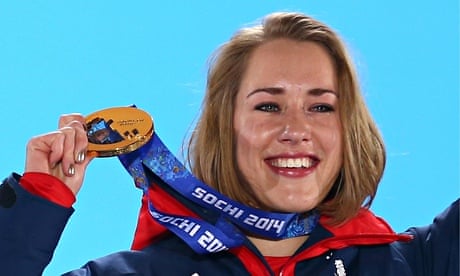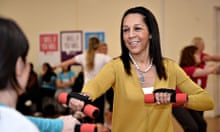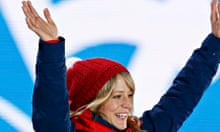Great Britain's most recent Olympic gold medallist has vowed to use her sudden fame to inspire more girls to play sport and challenge "the media image of the perfect woman". Lizzy Yarnold, who became just the fifth British athlete to win individual gold at a Winter Olympics when she defeated her skeleton rivals by almost a second on Friday, said she was determined to convince more girls to stay involved with sport.
The 25-year-old said she planned to go into "as many schools as possible", secondary and primary, to convince children to be active. "It doesn't have to be skeleton, it could be just at lunchtimes or after school," she said. "Not worrying about what the media image is of the perfect woman, it's about being you and being proud and confident about who you are."
Despite hopes that the heroics of Jessica Ennis-Hill, Katherine Grainger, Nicola Adams and others at London 2012 would help inspire more girls to play more sport, there remains a large gender gap in participation.
Ennis-Hill has also spoken out on the subject of body image, saying it is important that "girls aren't afraid of sport".
She recalled after London 2012 that in her early days her coach had to convince her that having muscles wasn't unfeminine. "He was right, but it's hard when you're younger and want to look like everyone else," she said.
Successful athletes, such as the swimmer Rebecca Adlington and the gymnast Beth Tweddle, have also been targeted by Twitter trolls over their looks.
Nationwide, there are 1.7 million fewer women participating in sport than men. Many drop out of sport at secondary school, with a further decline at the age of 16.
Research by the Women's Sport and Fitness Foundation (WSFF) has shown that many girls are starting to drop out of sport at the age of eight. By the time they are 14, only 8% of girls do the recommended one hour of physical activity a day.
The WSFF has consistently argued that more media coverage for women's sport will give children stronger role models.
"There are so many strong women in sport. I hope we can get more publicity, get in the papers more, get more sport on TV," said Yarnold, who was a heptathlete before taking up skeleton at the age of 19.
"The cricketers are very strong in Britain, the footballers are great athletes. I intend to go into as many schools as I can, secondary and primary, to tell them to get involved in sport."
When Yarnold was discovered by a talent search scheme called Girls4Gold, she had never heard of the sport of skeleton. But within three years she had won her first World Cup race and two years later was Olympic champion.
The rower Helen Glover, who won Britain's first gold of London 2012 in the coxless pairs alongside Heather Stanning, was discovered by an earlier scheme called Sporting Giants.
Yarnold, who has vowed to become the first skeleton slider to defend their Olympic title in Pyeongchang, South Korea, in 2018, said her story showed that some athletes found their best sport late.
"Now I'm Olympic champion, there's a lot of responsibility that comes with the gold medal. I understand that," said Yarnold, whose mother, Judith, is a PE teacher.
She said that when she was younger her hero was the heptathlete Denise Lewis and that a visit to her school, Maidstone Grammar in Kent, by the javelin thrower Goldie Sayers also stuck in her memory.
"It was always my aim to go into schools and inspire them and tell them about my career in skeleton and that I found it so late and to say that you can do it. Whether it's arts or music or sport, you've got to follow your dream and dedicate a lot of time to it."
Yarnold's gold continues a remarkable run of female success at the Winter Games – Britain's six most recent medals have all been won by women.
The sports minister, Helen Grant, told a Commons select committee inquiry into women's sport this month that she wanted to abolish the gender gap in sports participation.
The grassroots funding body Sport England has been charged with getting more women to play sport and boosting the number of 16 to 25-year-olds.
But its latest survey showed that the number of young people playing sport had actually declined since the London Olympics.
A Lords committee that looked into the Olympic legacy last year said last week it was disappointed at the limited progress that had been made in following up its recommendations.
Ruth Holdaway, chief executive of the WSFF, has welcomed the increased focus on boosting female participation but said a range of measures were required.
"For more women to be inspired and get involved in sport and to prevent these worrying dropout rates, we need a concerted effort to invest in grassroots activities that are specifically marketed to women and girls," she said.
"Women's sport needs more media coverage and we need better sponsorship opportunities for elite athletes – it's a whole package."




Comments (…)
Sign in or create your Guardian account to join the discussion